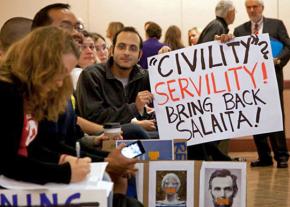Don’t let fear be the lesson
In 2015, was wrongly terminated by the University of Illinois at Urbana-Champaign (UIUC) because of his tweets condemning Israel's barbaric bombing of Gaza, which the university claimed were "uncivil."
The Palestine solidarity movement rallied to Salaita's defense, and UIUC was eventually forced to settle financially with him. Salaita then took a position with the American University of Beirut (AUB) as the Edward W. Said Chair of American Studies and has been living in Lebanon with his family since. But last year, AUB President Fadlo Khuri called off a search for a director of the Center for American Studies and Research when a search committee unanimously recommended Salaita. Critics claimed that AUB was again making Salaita a target, while AUB said the search had been marred by "conflicts of interest and misconduct."
Salaita has announced that he and his family are returning to the U.S. Unable to find a job in academia, he plans on writing and speaking. In this statement first published on social media, Salaita describes what's next for him--and why he does not regret his decision to speak out against Israel and in defense of Palestinian rights.
A FEW thoughts on leaving academe: Next week, I will depart Beirut and return to the D.C. area. I'm grateful to the students and friends who made our time in Lebanon so rewarding. We'll remember this period with great fondness. My son grew from a toddler into a little boy in Beirut. His first memories are registered at AUB [American University of Beirut].
Despite applying to positions on four continents, I was unable to find an academic job, so I no longer count myself among the professoriate. A number of colleagues have attempted to recruit me, but their efforts always get shut down by management. In turn, I often feel like I'm reliving the UIUC fiasco, which isn't conducive to the kind of mood I prefer to inhabit. I'm easygoing, but I refuse to tolerate the indignities of a blacklist.
My immediate plan is to write and give talks. I'm still young and energetic. I don't intend to slosh around in self-pity. Whatever I end up doing, I will maintain the spirit of noncompliance that defined my time in academe. If you take any lesson from my ouster, please don't let it be fear or caution. Docility is a gift to those who profit from injustice. Academe can no longer afford this luxury.

People still ask if I would go back in time and change anything. I would not. If my behavior were dishonorable, then I might have something to regret. I condemned a brutal ethnocratic state. On this count, I will die unapologetic. And insofar as we are forced to contemplate life in binaries, I prefer unemployment to subservience. My heart is with those who struggle for dignity amid terrible oppression. I spare no loyalty to a bourgeois industry that rewards self-importance and conformity.
Despite every node of my disposition screaming at me not to say what I'm about to say, I again surrender to my lesser judgment: I leave academe feeling that, no matter my copious shortcomings, I managed to remain a decent human being. Zionists have worked overtime to incriminate me, but they've never found anything incriminating--not from a lack of diligence, but because there's nothing to find but plainspoken disdain for settler colonization. I haven't always been a good professor--I'm disorganized and forgetful and reclusive and unresponsive and an easy grader--but I've never compromised my ethics or sold out colleagues and students in order to ingratiate myself to power.
Thank you for entertaining my self-indulgence. If my words sound incompatible with the demands of nuance and discretion that predominate in academic culture, then it's because I'm no longer of the culture and thus unconstrained by its emphasis on disinterest and diplomacy. I can speak according to the whims of my conscience. This is what happens when you manage to survive a punishment. You become free.


